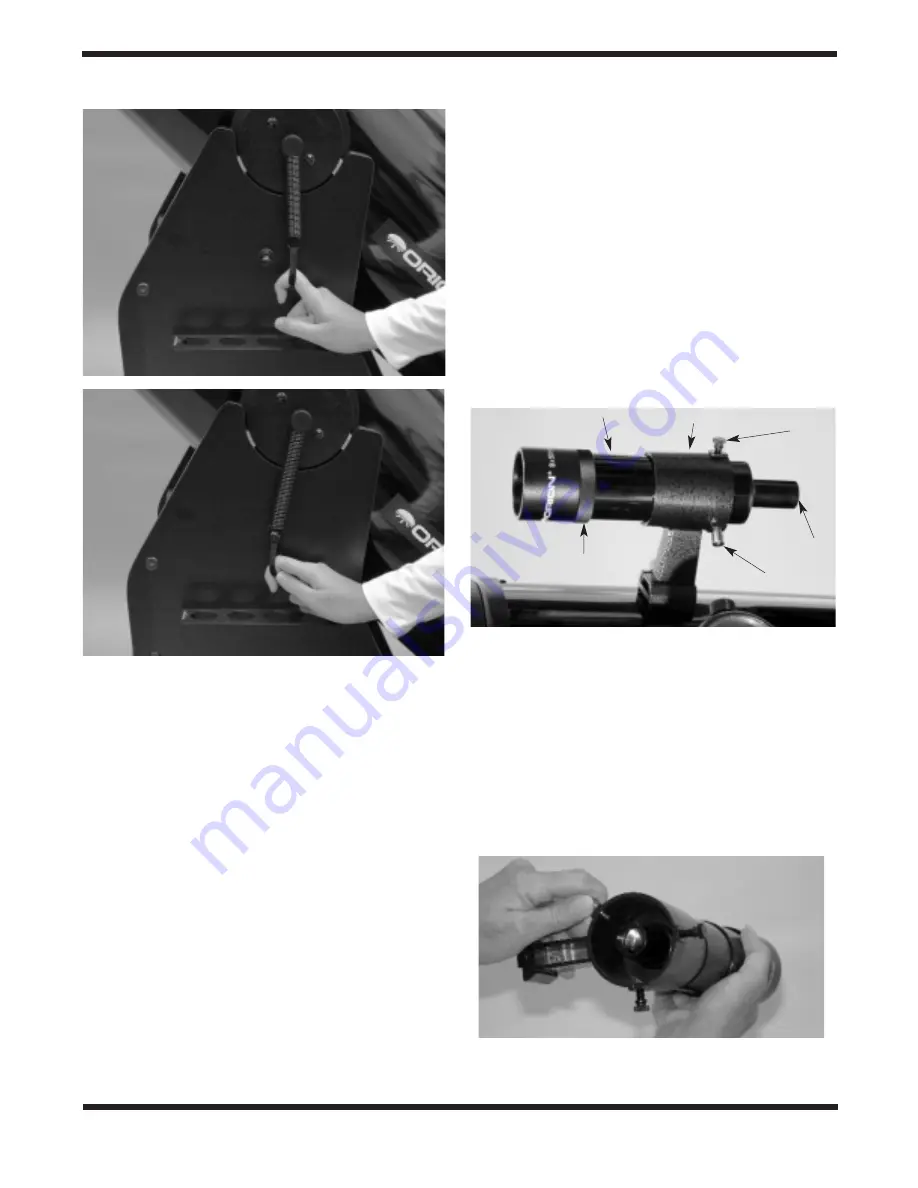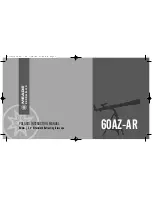
1. Put one of the black nylon spacers on a black Phillips
head screw. The spacer should be oriented so the narrow
end seats against the head of the screw. Slip one of the
black 1/4" washers over the end of the screw. Now, thread
the screw into the hole in the base side panel just below
the cradle. The screw will thread into the preinstalled
insert in the hole. Use a Phillips screwdriver to tighten the
screw. Repeat this procedure on the opposite side panel.
2. Next, insert one of the screws with round plastic knob
attached through the end ring of one of the springs. Slip a
black nylon spacer onto the screw. Orient the spacer so
the narrow end is closest to the knob. Thread the entire
assembly into the hole in the center of the telescope’s alti-
tude side bearing until tight. The end ring of the spring
should seat onto the narrow end of the spacer. Repeat this
procedure for the other altitude side bearing.
3. Attach a pull loop to the free end of each spring. Slide the
loop through the opening in the ring on the end of the
spring.
4. Now, pull each spring down using the pull loop, and posi-
tion the spring’s end ring over the head of the Phillips
screw (installed in step 1) and onto the narrow part of the
nylon spacer, as shown in Figure 7. You needn’t attach
both springs simultaneously; one at a time is fine.
The CorrecTension system is now installed and engaged. If
you wish to remove the telescope from the base, you will first
need to disconnect the springs from the “posts” on the
Dobsonian base. The springs will remain captive on the alti-
tude side bearings, so they will not get lost.
Installing the Finder Scope
SkyQuest XT10 Dobsonians come with a high quality, large
aperture 9x50 achromatic crosshair finder scope (Figure 8a)
as standard equipment. This greatly aids in finding objects to
view in the night sky, which will be discussed in detail later.
To place the finder scope in the finder scope bracket, first
unthread the two black nylon thumbscrews until the screw
ends are flush with the inside diameter of the bracket. Place
the O-ring that comes on the base of the bracket over the
body of the finder scope until it seats into the slot on the mid-
dle of the finder scope. Slide the eyepiece end (narrow end)
of the finder scope into the end of the bracket’s cylinder oppo-
site the alignment thumbscrews while pulling the chrome,
spring-loaded tensioner on the bracket with your fingers
(Figure 8b). Push the finder scope through the bracket until
6
Figure 7.
(a)
To attach the spring to the base, grip the pull loop
with your index finger and pull down on the spring.
(b)
While pulling
down, slip the end ring of the spring over the screw head and onto
the narrow part of the nylon spacer, then release the pull loop.
a.
b.
Figure 8a.
The 9x50 finder scope and bracket.
Tensioner
Eyepiece
Nylon
alignment
thumbscrew (2)
Focus lock ring
Finder scope
Finder scope bracket
Figure 8b.
Pull back on the tensioner and slide the finder scope
into its bracket until the O-ring is seated in the bracket ring.
Summary of Contents for SkyQuest XT10 9810
Page 17: ...17 ...






























